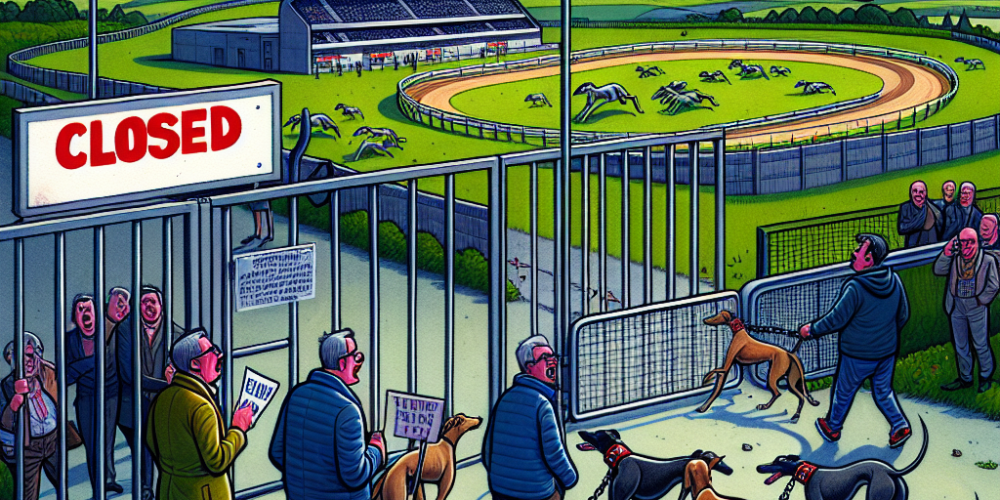Scotland has taken a definitive step towards banning greyhound racing, as the government officially announced its backing of the Prohibition of Greyhound Racing Bill. This legislative initiative, led by Scottish Green MSP Mark Ruskell, aims to abolish what is described as a dangerous and gambling-driven sport that poses significant risks to animal welfare.
The push to end greyhound racing has been spearheaded by Ruskell and like-minded officials who have long criticized the practice on the grounds of animal cruelty. They argue that the sport inherently endangers the lives of greyhounds, with no method to ensure their safety while racing at high speeds. The concerning number of injuries and deaths on the track has only fueled the urgency of this legislative effort. In 2023 alone, statistics revealed that 109 greyhounds died on the track, while an additional 4,238 sustained various injuries, highlighting the perilous nature of the sport.
Amid growing public support for animal rights, Agriculture Minister Jim Fairlie confirmed the government’s endorsement of the bill, signifying a potential seismic shift within the industry. This development has been met with applause from animal welfare advocates who have long campaigned for the cessation of greyhound racing.
However, the Greyhound Board of Great Britain has criticized the move, deeming it unnecessary and illogical. They argue that since Scotland currently has no operational greyhound racing tracks—following the closure of Thornton Stadium in Kirkcaldy earlier this year—the bill addresses a non-existent issue in the region. The board contends that the government’s focus should be redirected to more pressing matters, rather than targeting a defunct sport.
Despite the absence of active greyhound racing in Scotland, proponents of the bill argue that an official ban is crucial to ensure the industry does not make a resurgence. They maintain that this legislative action would act as a preventive measure, safeguarding against any future attempts to reintroduce the sport.
The debate surrounding greyhound racing is not confined to Scotland. In Wales, similar efforts are underway to eliminate the sport, despite pushback from industry representatives advocating for stricter regulations instead of an outright ban. The Greyhound Board of Great Britain has even sought a judicial review of Welsh Ministers’ decision to ban the sport, hoping to challenge and possibly overturn it.
Across the Atlantic, the movement against greyhound racing has gained traction as well. Recently, Oregon made headlines by abolishing the sport, a move hailed as a significant victory for American greyhound advocates since Florida’s landmark decision to outlaw dog racing in 2018. This international trend reflects a growing consensus that animal welfare should take precedence over traditional sports and entertainment practices.
As Scotland’s Prohibition of Greyhound Racing Bill advances towards a parliamentary review, the conversation around animal rights continues to evolve. Supporters of the ban argue that it represents a moral imperative, a necessary step towards a more humane society that prioritizes the well-being of animals over gambling interests.
Critics, however, warn that such measures could lead to unintended economic consequences, potentially affecting communities that once relied on greyhound racing for employment and tourism. They suggest that a balanced approach, involving stricter safety regulations and oversight, might be more beneficial than an outright prohibition.
Nevertheless, the momentum for change seems to be growing, with more regions re-evaluating their stance on greyhound racing. This shift signals a broader societal transformation, where ethical considerations are increasingly influencing policy decisions. As debates continue, the outcome in Scotland could set a precedent, inspiring similar actions in other parts of the UK and beyond.
While the future of greyhound racing remains uncertain, the ongoing discussions underscore the complexities of balancing tradition, economic interests, and animal welfare in modern society. As policymakers deliberate, the voices of both advocates and opponents will play a crucial role in shaping the path forward. The coming months will be pivotal in determining whether the proposed ban will become law, potentially marking the end of greyhound racing in Scotland and contributing to a wider movement towards the protection of animal rights globally.

Garry Sputnim is a seasoned journalist and storyteller with over a decade of experience in the trenches of global news. With a keen eye for uncovering stories that resonate, Alex has reported from over 30 countries, bringing light to untold narratives and the human faces behind the headlines. Specializing in investigative journalism, Garry has a knack for technology and social justice issues, weaving compelling narratives that bridge tech and humanity. Outside the newsroom, Garry is an avid rock climber and podcast host, exploring stories of resilience and innovation.
















